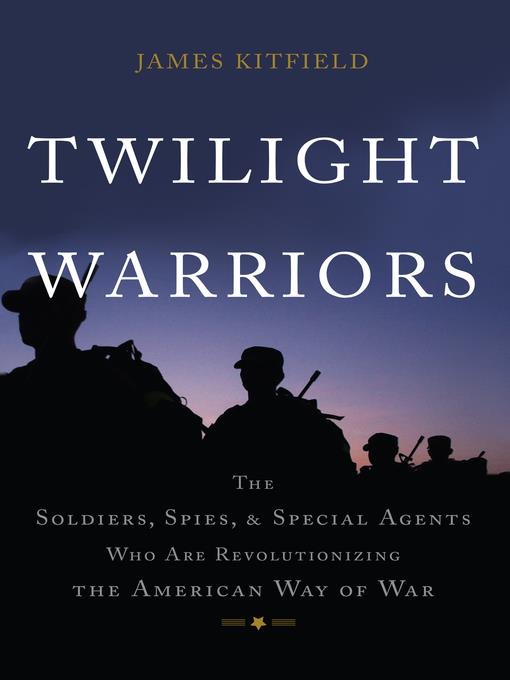
Twilight Warriors
The Soldiers, Spies, and Special Agents Who Are Revolutionizing the American Way of War
کتاب های مرتبط
- اطلاعات
- نقد و بررسی
- دیدگاه کاربران
نقد و بررسی

September 12, 2016
Kitfield (War and Destiny), a senior fellow at the Center for the Study of the Presidency and Congress, analyzes the cadre of leaders that came of age during the wars in Iraq and Afghanistan, asserting that the U.S. national security apparatus has developed a new and devastatingly effective approach to war. This new approach is based on the F3EA techniques pioneered by generals Stanley McChrystal and Mike Flynn in Iraq: “find, fix, finish, exploit, and analyze.” Kitfield’s well-researched argument, based on interviews and personal experience, describes the professional development and interaction of these and other innovators as they come to occupy some of the highest positions in the national security structure. A new cooperative interagency culture is a hallmark of the tactics employed globally as the centerpiece of U.S. counterterrorism strategy. Kitfield acknowledges that the F3EA tactic is not a war winner, but rather provides time for other more deliberate and traditional nation-building strategies to win. He also includes in his analysis the rise of ISIS in Syria and Iraq, European immigration issues, and the recent Paris (2015) and Brussels (2016) terrorist attacks. Kitfield’s insightful and timely work highlights the gaps between policy makers and military brass. Agent: Andrew Stuart, Stuart Agency.

A compelling chronological examination of the new intelligence-driven, multiagency counterterrorism model the U.S. military now uses to meet the "Age of Superterrorism."In order to penetrate the layers of official agency and military-speak, Kitfield (Senior Fellow/Center for the Study of the Presidency and Congress; War & Destiny: How the Bush Revolution in Foreign and Military Affairs Redefined American Power, 2005, etc.) begins with the American response to 9/11 via the unprecedented scope provided by the Donald Rumsfeld Pentagon to the U.S. Special Operation Forces in Afghanistan, led by Col. John Mulholland. Featuring strategic air attacks during Operation Enduring Freedom, led by Air Force Maj. Gen. David Deptula--drones turned out to be the "real game changer"--the vast U.S. national security apparatus successfully melded into a synergy of operation despite long-standing jealousies among agencies like the FBI, CIA, and National Security Agency. However, the failure to capture Osama bin Laden when he was within reach at Tora Bora in late 2001 and the controversy over CIA interrogation tactics of "enemy combatants" at secret "black sites" opened up old scores of ineptitude. During the subsequent war in Iraq, both generals Stanley McChrystal and David Petraeus had significant roles in transforming the vast counterterrorism apparatus--e.g., McChrystal created Task Force 714, "combining under one roof all the military, intelligence, and law enforcement agencies that had a piece of the counterterrorism mission." Improvised explosive devices, suicide bombings, and assassinations of Western journalists and others demanded new ways of gaining information and rooting out terrorist cells, as Kitfield amply illustrates in his discussion of the intensive manhunt for al-Qaida leader Abu Musab al-Zarqawi in 2006. The author also addresses the Obama administration's attempts at drawdown and discrete, targeted operations, while the homeland threat--e.g., the 2013 Boston Marathon bombing--would prompt the NSA's massive collection of metadata in the communications of average Americans, to worldwide outcry. Kitfield gets inside the U.S. military "brotherhood" to produce an engaging and chilling report. COPYRIGHT(1) Kirkus Reviews, ALL RIGHTS RESERVED.

Starred review from October 1, 2016
After the U.S. invasions of Afghanistan and Iraq, those wars evolved into insurgency warfare, which is much harder to deal with than more traditional warfare and doesn't provide the kind of big payoff that Americans desire. Veteran reporter Kitfield (senior fellow, Ctr. for the Study of the Presidency & Congress) relates how some dedicated military professionals strove to meld various military units with the FBI and other intelligence agencies, an organizational and doctrinal shift that took a lot of time and effort. He shows how smaller units and actions were more effective with better intelligence and faster reaction times. He is disgusted that some generals who did so much to change the way that the United States fought wars were brought down by seemingly common human mistakes and bureaucratic opposition. Kitfield warns that while various analyses of the situation may be correct and forward thinking, our national leaders keep making bad decisions because they are politically expedient and not paying the direct price of failure (e.g., dead friends and relatives). VERDICT This easy-to-read book tells how America can fight a different kind of war if those in charge are open to change and experimentation by those who are doing the grunt work in the field.--Daniel Blewett, Coll. of DuPage Lib., Glen Ellyn, IL
Copyright 2016 Library Journal, LLC Used with permission.

























دیدگاه کاربران